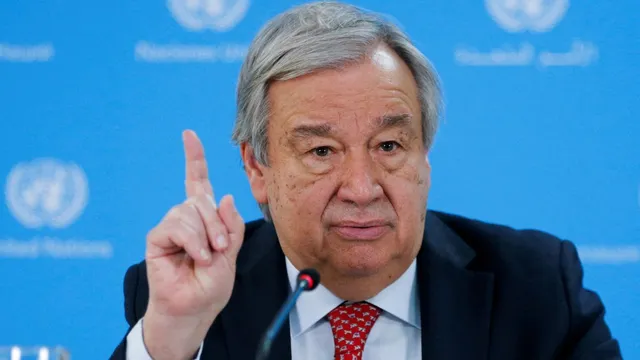- By Supratik Das
- Tue, 18 Nov 2025 10:40 AM (IST)
- Source:JND
Sheikh Hasina news: United Nations Secretary-General António Guterres has firmly opposed the death penalty handed down to former Bangladesh Prime Minister Sheikh Hasina, calling the verdict a matter of deep concern for the global body. His spokesperson, Stéphane Dujarric, told reporters on Monday that the United Nations rejects the use of the death penalty “in all circumstances”, regardless of the nature of the allegations involved.
The sentence was delivered in absentia by a Bangladeshi tribunal that convicted Hasina of “crimes against humanity” linked to the violent suppression of student-led protests last year.
UN Human Rights Office Raises Due Process Questions
Dujarric pointed to remarks by UN High Commissioner for Human Rights Volker Türk, saying the Secretary-General “fully agrees” with the High Commissioner’s concerns. The UN rights office highlighted that while the verdict marks a significant moment for victims of last year’s violence, the trial itself was not observed by UN monitors.
Ravina Shamdasani, spokesperson for the High Commissioner’s office, said from Geneva that trials conducted in absentia, especially those involving the death penalty, must “unquestionably meet international standards of due process and fair trial”. She noted the UN was “not privy to the conduct of this trial”, underscoring the need for transparency and strict adherence to international norms.
Revived Tribunal Under Spotlight
International Crimes Tribunal (ICT), is composed entirely of Bangladeshi judges pronounced the verdict on Mnday. Initially established to prosecute atrocities committed during the 1971 Liberation War, the tribunal was revived by the interim government led by Nobel laureate Muhammad Yunus after Hasina’s ouster.
The tribunal’s renewed mandate now includes cases related to the deadly crackdown on protests that shook Bangladesh last year. Hasina and her former Home Minister Asaduzzaman Khan Kamal were both convicted under this framework.
The Office of the High Commissioner for Human Rights (OHCHR) referenced its February 2025 report, which documented systematic rights violations during the 2024 protests. The report alleged widespread use of excessive force, unlawful killings, and targeted repression by state authorities. “The testimonies and evidence we gathered paint a disturbing picture of rampant state violence and targeted killings,” Türk said earlier this year, noting that some abuses may amount to international crimes.
ALSO READ: India’s First Reaction To Sheikh Hasina’s Death Verdict: ‘Remains Committed To...'
Call For Abolition Of Death Penalty
As part of its long-standing advocacy, the UN has called for the universal abolition of capital punishment. The High Commissioner emphasised that the death sentence in Hasina’s case makes procedural fairness “particularly vital”. OHCHR has also repeatedly urged Bangladesh to ensure accountability in line with global standards and to provide victims access to justice and reparations.
Türk urged all sides in Bangladesh to maintain calm, exercise restraint, and work towards a process of “truth-telling, reparation and justice” that supports long-term national reconciliation.

